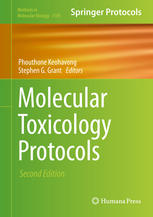

Most ebook files are in PDF format, so you can easily read them using various software such as Foxit Reader or directly on the Google Chrome browser.
Some ebook files are released by publishers in other formats such as .awz, .mobi, .epub, .fb2, etc. You may need to install specific software to read these formats on mobile/PC, such as Calibre.
Please read the tutorial at this link: https://ebookbell.com/faq
We offer FREE conversion to the popular formats you request; however, this may take some time. Therefore, right after payment, please email us, and we will try to provide the service as quickly as possible.
For some exceptional file formats or broken links (if any), please refrain from opening any disputes. Instead, email us first, and we will try to assist within a maximum of 6 hours.
EbookBell Team

5.0
110 reviewsMolecular Toxicology Protocols, Second Edition aims to bring together a series of articles describing validated methods to elucidate specific molecular aspects of toxicology, the emphasis being on the application of molecular methods to genetic toxicology. The volume is divided into ten parts, roughly corresponding to the spectrum of biomarkers intermediate between exposure and disease outcomes as proposed in molecular epidemiology models. Subjects of these new chapters range from preparation of fluid specimens for analysis of cellular inflammatory responses to genotoxic insults to sensitive methods for proteomic analysis and aberrant DNA methylation patterns. Written in the successful Methods in Molecular Biology series format, chapters include introductions to their respective topics, lists of the necessary materials and reagents, step-by-step, readily reproducible protocols, and notes on troubleshooting and avoiding known pitfalls.
Authoritative and easily accessible, Molecular Toxicology Protocols, Second Edition addresses not only the needs of molecular biologists and toxicologists, but also those of individuals interested in applying molecular methods to clinical applications, such as geneticists, pathologists, biochemists, and epidemiologists.